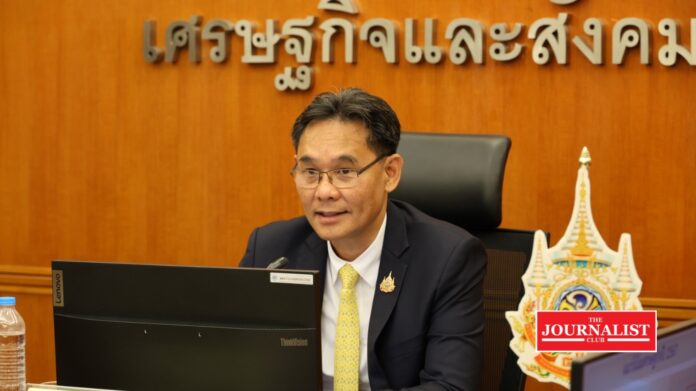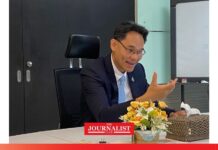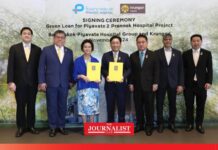

Total investment in the second quarter shrank by 6.2%, a contraction for three consecutive quarters. The National Economic and Social Development Council (NESDC) pointed out the real estate sector was a significant reason to drag down the Thai economy in the second quarter to grow only 2.3%.
NESDC reported private investment declined by 6.8% in Q2 because there was no investment in new projects in the real estate sector due to consumers having no purchasing power. Normally, real estate investment accounted for 50% of investment in GDP.
“This was a significant sign to show weakness of purchasing power because of the contraction of three consecutive private investments. There was also a factor in the real estate investment sector which has clearly slowed down with investing in the real estate sector down more than 50%. They were caused by the purchasing power of the people that has greatly decreased due to lack of liquidity for spending Including the increasing strictness in approving residential loans by commercial banks, which requires more targeted debt resolution measures.” Said Danucha Pichayanan Secretary-General of the National Economic and Social Development Council NESDB.
Public investment also decreased by 4.3 %
NESDB reported a decrease in the machinery and equipment investment by 8.1 %. This was in line with a decrease in vehicle investment by 22.5 % and a deceleration of capital goods’ import. Meanwhile, construction investment dropped by 2.2 % due to decreases in both residential and commercial building constructions. In contrast, factory building construction continued to expand.
Public investment decreased by 4.3 %, compared with a 27.7-% contraction in the previous quarter. The investment of the general government dropped by 12.8 %t, while investment of state-owned Enterprises (SOEs) expanded by 10.1 %.
The disbursement rate of capital budget in this quarter was 24.0 % of total budget, (higher than 5.7 % in the previous quarter and 19.0 % in the same quarter of last year).
In the first half of 2024, total investment decreased by 5.1 %, in which private investment contracted by 0.9 % and public investment decreased by 16.7 %.
Private investment is project to expand only 0.3% this year
In this case NESDB expected that private investment will expand approximately throughout the year 0.3%, down from the original forecast that private investment would expand by 3.2%
Government investment, NESDB expected a contraction of 0.7% from the original estimate of a contraction from the previous year 1.8%. In the remaining period of this year, government investment budget disbursement will accelerate more than in the past period because the investment budget has already been made contracts. At present, the investment budget has been disbursed approximately 100 billion baht.
Economic management for the remainder of 2024
The agency suggested economic management for the remainder of 2024 should prioritize on;
1) Maintaining domestic economic and political stability, particularly to ensure the continuation of the budget process in order to sustain government expenditure and investment momentum to be able to support the economy over the remaining of the year, as well as not to impact investor confidence.
2) Stimulating private investment by; (1) enhancing foreign investor confidence through utilizing benefits on investment base relocations, together with expediting the implementation of projects with investment promotion certificates during 2022 – 2024 to start their actual investments in order to drive the expansion of the production sector and the export sector of key potential and high demand products, such as high-value food products, health-related and eco-friendly products, as well as those strategically positioned to benefit from geopolitical conflicts and trade protections; (2) developing a conducive ecosystem for targeted industries and services to invest in Thailand, especially reducing barriers in related procedures, regulations, and laws, addressing labor shortages in the manufacturing sector, and enhancing labor productivity to brace for new targeted industries and services;
(3) accelerating infrastructure investment projects and the development of specialized economic zones in accordance with the established plans; and
(4) boosting productivity through the utilization of innovation and cutting-edge technology to promote high-value goods production that surpasses price competition and aligns with major importers’ standard, along with developing domestic industries related to raw materials and intermediate goods to enhance their readiness and ability to integrate with global value chain.
3) Monitoring and addressing unfair trade practices by (1) implementing a strict inspection and monitoring market dumping and unfair trade measures from major exporting countries and facilitate business operators in accessing anti-dumping, countervailing-duty, and anti-circumvention (AD/CVD/AC) measures; (2) improving the quality inspection process of imported products to be more rigorous and thorough, and expediting the issuance of product standard protocol to cover imported products including fostering collaboration to establish agreements on the mutual recognition of international standards and increasing penalties for those importing substandard products; and (3) strengthening enforcement against illegal importation, tax evasion, or exploitation of legal loopholes to advantage the business.
4) Ensuring adequate liquidity for the business sector, especially providing access to formal credit for high-potential SMEs experiencing financial difficulties, along with leveraging technological advancement to increase business efficiency which could help support better access to funding sources. In addition, measures should be take to address persistent debtors at risk of defaulting, particularly vulnerable groups.
5) Expediting budget disbursement to enable government expenditure to support the economy promptly by prioritizing the disbursement of capital expenditure budgets to support local economic growth, especially through investment projects by local governments, while concurrently accelerating the budget preparation process for FY2025 to be as scheduled.
6) Preparing for the impacts of climate change, particularly the La Niña phenomenon which may increase the risk of flooding later in this year and the El Niño phenomenon that may lead to the risk of drought during next year, by prioritizing water resource management, upgrading the efficiency of infrastructure and warning systems as well as educating farmers on the effects of climate change and the principles of proper water usage in cultivation, along with bolstering farmers’ resilience by promoting and developing crop insurance systems to protect against climate risk.
7) Expediting efforts to address air pollution issues (PM2.5) and preparing key ecosystem to support tourism, such as airport and inbound flight availability, immigration procedure, infrastructure and facilitation, spatial and environmental management, as well as sustaining high standard of safety for tourists to be ready for tourists return during the upcoming high season in order to enhance the tourism sector’s potential, quality, and sustainability, while simultaneously prioritizing air pollution control to prevent long-term negative impacts on public health and the overall economy.
8) Preparing for mitigating the impacts as well as seizing opportunities arising from global economic and trade volatilityincluding intensified geopolitical conflicts, trade barriers, climate change, and fluctuations in global financial markets.
The National Economic and Social Development Council
Related News : NESDC maintained 2.5% of the economic growth this year










